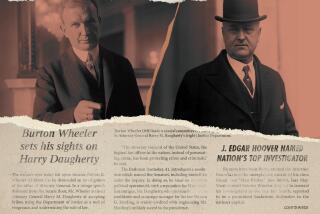Ex-Regulator Tells ‘Danger’ to U.S. in ‘Keating 5’ Acts : Thrifts: Gray tells a Senate ethics panel that the senators’ intervention hampered his efforts at enforcement and raised cost of the S&L; bailout.
- Share via
WASHINGTON — Former savings and loan regulator Edwin J. Gray said Monday that the intervention of five U.S. senators, including Sen. Alan Cranston (D-Calif.), on behalf of S&L; owner Charles H. Keating Jr. constituted a “clear and present danger” to the nation.
The senators’ efforts, coming at a crucial time for the thrift industry, hampered Gray’s attempts to stop harmful land speculation by Keating’s Lincoln Savings & Loan and other institutions, the former regulator said. Such political pressure raised the eventual cost of the federal government’s bailout of thrifts, he said.
The former chairman of the Federal Home Loan Bank Board took an aggressive stance in his first day of testimony before the Senate Ethics Committee, portraying himself as a crusading regulator hounded by angry businessmen and politicians.
The committee is investigating whether the five senators transgressed ethical boundaries in assisting Lincoln, which collapsed in 1989 in the biggest single failure in the S&L; debacle. Keating and his associates gave $1.3 million to the campaigns and related political activities of the senators.
During his leadership of the bank board from 1983 to 1987, “I warned of the consequences” of free-wheeling S&L; practices “so often and continuously that I became known as Chicken Little and as an alarmist,” Gray told the committee.
However, “the very powerful and financially generous thrift lobby in Washington” thwarted all his efforts to curtail risky investments and enact other reforms, Gray said. “The pressures during those years came from the Hill (Congress) as well as the executive branch and the media. And the congressional pressures were heaviest of all.”
He said that he suffered “years of private threats and public vilification” for his attempts.
Gray indicated that he is braced for intensive cross-examination by the lawyers for the five senators: Cranston, Dennis DeConcini (D-Ariz.), John McCain (R-Ariz.), John Glenn (D-Ohio) and Donald W. Riegle Jr. (D-Mich.).
The five are expected to raise the issue of Gray’s own financial problems to attack his credibility. Those include his repayments of $27,000 to the regional home loan banks for money spent on personal activities and travels.
Past attacks on his office and personal expenditures “were part of a pattern of pressures meant to discredit me and derail the effort to achieve S&L; reform,” and “some would like this issue to play the same role at these hearings,” Gray said.
The five senators have argued that they did nothing wrong in meeting twice in April, 1987, with Gray and other officials of the Home Loan Bank Board. Rather than pressuring him in exchange for campaign contributions, the senators have said, they simply sought to do their duty representing a business that had complained about unfair treatment by regulators.
Gray charged that the senators were ignoring an overriding duty to protect the public welfare.
”. . . I have always assumed that we also send our senators to Washington because we think they will have the sense to know when narrow constituent demands must take a back seat to the safety of their constituents as a whole,” Gray said.
The former regulator said that he had faced strong opposition almost from his first days as bank board chairman in 1983, when he became fearful about the risky investments of thrifts. California and other states had given S&Ls; powers to put insured deposits into new fields of business.
“If their ventures failed, the Federal Savings and Loan Insurance Corp.--that is to say, the taxpayers--would be required to pay all losses,” Gray said. The government insures deposits up to $100,000.
When Gray moved to restrict Irvine-based Lincoln’s ability to make speculative investments, Keating enrolled powerful politicians to get him to back off, the regulator said. At the 1987 meetings with the senators, “we were not discussing a normal regulatory issue to be addressed through the normal kinds of pressure, negotiation and compromise,” he said. “This was a matter of clear and present danger to the nation and demanded a more sober treatment.”
This meeting and other forms of political pressure, he said, were “designed not just to change particular decisions by the bank board but to render us unable to carry out our central responsibilities.”
He added: “No one in Washington with the slightest knowledge of this issue can have been ignorant of this situation or the effect it would have on the way the regulators received and interpreted messages from senators and congressmen.”
In other testimony Monday, an aide to DeConcini said that she strongly advised her boss against attending the April 2, 1987, meeting with Gray to discuss Lincoln’s problems.
“I didn’t think it was a good idea and would later be misinterpreted by the press,” said Laurie A. Sedlmayr, an assistant to the Arizona senator on banking issues.
“I thought it was a political mistake,” she said.
“Why,?” asked committee special counsel Robert S. Bennett.
“We’re here,” responded Sedlmayr, drawing a ripple of laughter in the ornate hearing room in the Senate’s Hart office building.
Sedlmayr said that she believed that there was nothing wrong with the “propriety” of the meeting but emphasized to the senator that it could be harmful politically.
She said that she thought Keating was “perhaps more extreme than others in using the system,” referring to the ability of state-chartered S&Ls; to invest in risky businesses outside the traditional field of home mortgage lending. S&L; executives were talking about buying airlines, horse racing tracks and windmill farms, she noted.
Keating was “something of a zealot and I wasn’t comfortable with that,” Sedlmayr said.
More to Read
Get the L.A. Times Politics newsletter
Deeply reported insights into legislation, politics and policy from Sacramento, Washington and beyond. In your inbox twice per week.
You may occasionally receive promotional content from the Los Angeles Times.










